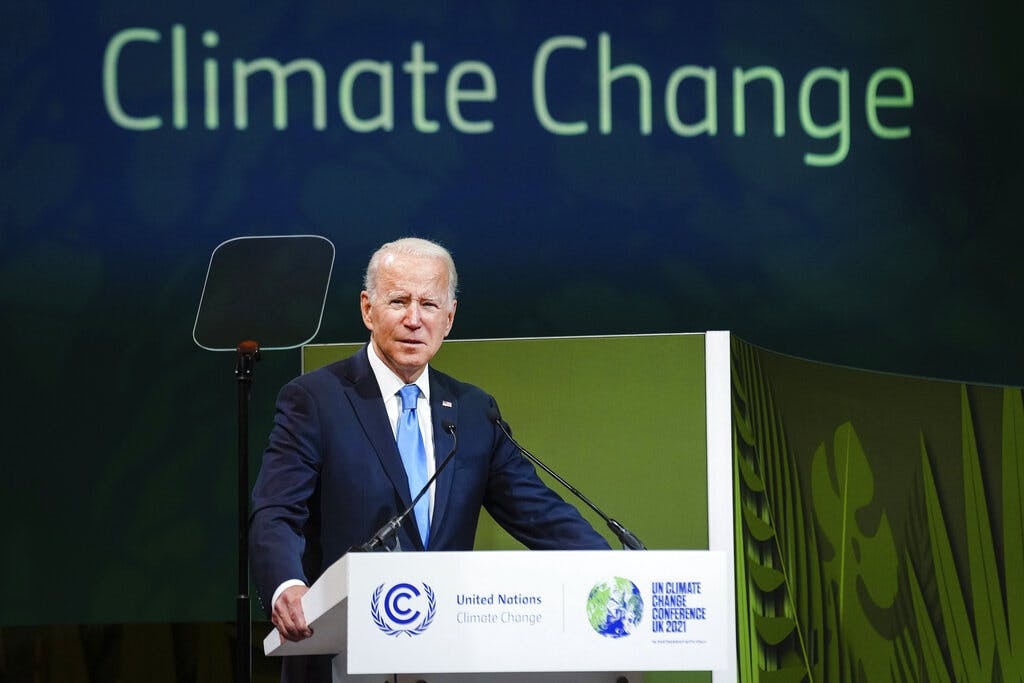GOP Looks To Block SEC’s New Emissions Reporting Rules for Public Companies
The Biden administration is pushing forward in virtually every regulatory realm in its zeal to appease climate activists both inside and outside the government.

Republicans on Capitol Hill are eyeing legislation to rein in the Securities and Exchange Commission as it reaches the final stages of drawing up new rules that would require public companies to document and report their emissions in the interest of combatting climate change.
In a 3-1 vote earlier this year, the SEC proposed rules that would force businesses to file in their disclosures how much greenhouse gas emissions and how much indirect pollution from purchased energy they are generating. The proposal would also require them to calculate how much indirect emissions they are causing by their operations up and down the value chain. The respective calculations are known as Scope 1, 2, and 3 in climate change circles.
The rules are nearing completion and are likely to be implemented within months, barring legal or legislative action. The impending deadline has prompted two Republican congressmen, Bill Huizenga of Michigan and Andy Barr of Kentucky, to introduce legislation that would preclude disclosures to only those that are material to investors.
The Mandatory Materiality Requirement Act of 2022, backed by the U.S. Chamber of Commerce, would task the SEC with determining whether “there is a substantial likelihood that a reasonable investor” would consider the disclosed information to be “important with respect to an investment decision.” If not, the SEC would not be able to require the disclosure. A companion bill was introduced previously by Senator Rounds of South Dakota.
“The materiality standard is the investor-driven backbone of our capital markets,” Mr. Barr, the lead Republican on a House Financial Services subcommittee, said. “Immaterial reporting requirements like those outlined in the Securities and Exchange Commission’s climate-related disclosure proposed rule place an undue burden on companies and small business, discriminatorily choke off energy companies’ access to capital, and threaten American energy security.”
An expansion of the reporting requirement “would not only damage our economy, it would negatively impact small businesses and make it more difficult for investors to retire with financial security,” Mr. Huizenga said.
The legislation, however, may be an effort to close the barn door after the horses have already fled. Climate change activists say such disclosures are deeply material to investors, who need to know which companies are contributing to “climate-related financial risk.”
“Climate-exacerbated extremes come at a huge financial cost,” a senior fellow for climate change policy at the Council on Foreign Relations, Alice Hill, told the House Select Committee on the Climate Crisis. “Fifteen separate weather and climate disasters with losses exceeding $1 billion have battered the United States this year. … 2022 marks the eighth straight year with at least 10 billion-dollar weather and climate-related disasters. 2020 and 2021 broke records.”
Despite UN acknowledgement that it will not meet the 2015 Paris Agreement of limiting global heating to 1.5 degrees Celsius by 2050, the Biden administration is pushing forward in virtually every regulatory realm in its zeal to appease climate activists both inside and outside government. New actions are aimed at pensions and retirement plans, insurance availability, household savings and credit, state and local government programs, the financial system, and the federal budget.
Last month the White House announced it would propose a new rule to require major federal contractors to set and disclose their emissions and reduction targets. The proposal was the administration’s exhibit at the UN’s Climate Change Conference held at Sharm el-Sheik, Egypt, in November.
With UN officials conceding that the long-term goal of global temperature reduction is unachievable, Republicans say the administration is ignoring the short-term needs of investors and retirees.
Some rural House Democrats have also expressed concern about the impact of the SEC’s Scope 3 rules on small businesses.
“We share your goal of increasing investor information about large public companies, and believe that understanding a company’s climate-related risks is important for investors to make good long-term decisions.” a group of Democratic lawmakers said in a letter to the SEC chairman, Gary Gensler.
“While we do not believe the proposal’s intent is to burden small and medium sized family farmers and businesses, we urge you to help alleviate these concerns by making that more clear and providing additional protections in any final rule,” they wrote.
The SEC insists that its rules are workable and will pass legal muster. The retiring ranking member on the Senate Banking Committee, Patrick Toomey, says he’s not so sure. He cites a June ruling by the U.S. Supreme Court in West Virginia v. EPA, which states that regulatory agencies may not exceed their rulemaking authority beyond their traditional expertise without clear congressional authorization.
“The SEC may not want to answer to Congress on its climate disclosure rule,” Mr. Toomey said. “But, ultimately, the SEC will have to answer to the courts, which should make it nervous.”

